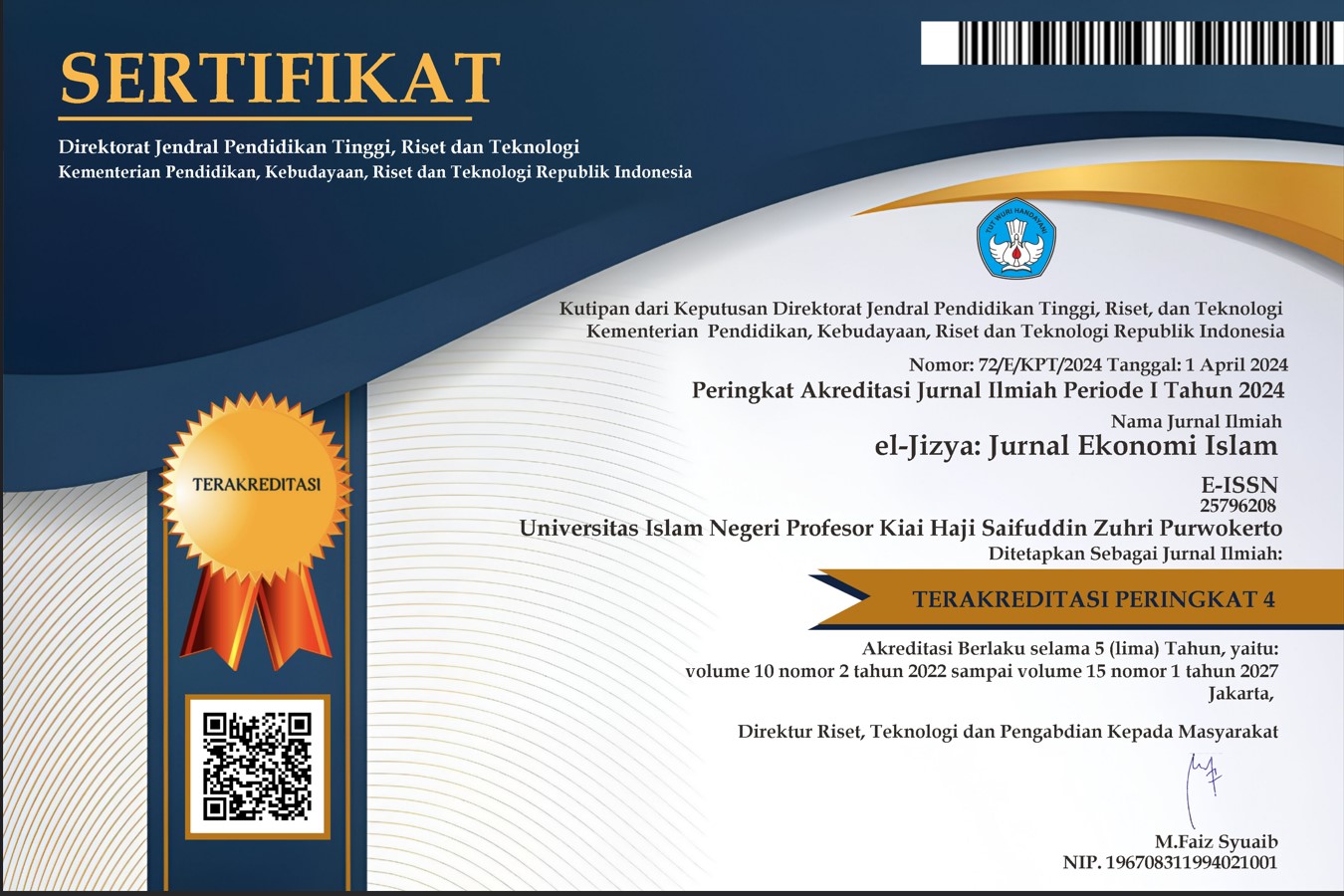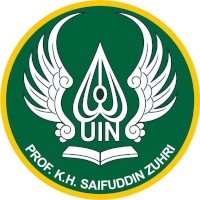The Politics of Public Finance Al-Mawardi’s Perspective: Al-Ahkam As Sulthaniyah
DOI:
https://doi.org/10.24090/ej.v12i1.9711Keywords:
public finance; al-mawardi; al-ahkam as sulthaniyahAbstract
This study aims to explore the concept of Al-Mawardi's public loan. This type of research is qualitative with an exploratory approach. Data collection uses the library method. Primary data was obtained from the book Al-Ahkam As Sulthaniyah and secondary data was obtained from several scientific journals and books related to this research. The analysis used is a qualitative analysis involving descriptive and interpretive data exploration. The results of the study show that the book Al-Ahkam As Sulthaniyah discusses state income, state expenditure, and the Baitul Mal. State revenue comes from zakat, ghanimah, and fai'. The state is only allowed to spend the treasures of the baitul mal as long as these expenditures are used for the public good. Al-Mawardi divided the two objectives of allocating Baitul Mal funds: first, for maslahah (benefit) and arfaq (provision of public facilities). Second, for the mandatory function. If the government has an obligation that is a mandatory function, while the funds in the baitul mal are empty, the government may make public loans because it is feared it will cause state chaos. And this policy was never carried out by the Prophet. If the leader dies, the next leader is responsible for repaying the loan.References
Abdullah, B. (2010). Peradaban Pemikiran Ekonomi Islam (D. Supriyadi (ed.)). CV Pustaka Setia.
Al-Khudhari, M. (2018). Bangkit dan Runtuhnya Daulah Abbasiyah (M. Irham & M. A. Zuhri (trans.)). Pustaka Al-Kautsar.
Al-Mawardi. (2014). Ahkam Sulthaniyah: Sistem Pemerintahan Khilafah Islam (I. Hikmatiar (ed.); K. Fath & Fathurrahman (trans.)). Qisthi Press.
Al-Mawardi, A. H. (1978). Al-Ahkam as Sulthaniyah wa Al-wilayat ad Diniyah. Dar al-Kutub.
Amalia, E. (2005). Sejarah Pemikiran Ekonomi Islam. Gramata Publishing.
Amin, M. (2016). Pemikiran Politik Al-Mawardi. Jurnal Politik Profetik, 4(2), 117–136. https://doi.org/10.24252/jpp.v4i2.2744
Amri, H. (2016). Kontribusi Pemikiran Ekonomi Abu Hasan Al-Mawardi. Economica Sharia, 2(1), 9–18.
Aryati, A. (2016). Pemikiran Pendidikan Al-Mawardi (Etika Antara Guru - Murid). At-Ta’lim, 15(1), 207–224.
Diana, R. (2017). Al-Mawardi dan Konsep Kenegaraan dalam Islam. Tsaqafah, 13(1), 157. https://doi.org/10.21111/tsaqafah.v13i1.981
Diana, R., Masruri, S., & Surwandono. (2018). Etika Politik dalam Perspektif al-Mawardi. Tsaqafah, 14(2), 363. https://doi.org/10.21111/tsaqafah.v14i2.2433
Islahi, A. A. (1997). HISTORY OF ECONOMIC THOUGHT IN ISLAM: A BIBLIOGRAPHY. Scientific Publishing Centre.
Islahi, A. A. (2009). A study of Muslim economic thinking in the 11th A.H. / 17th C.E. century. In Munich Personal RePEc Archive (Issue 75431). https://mpra.ub.uni-muenchen.de/75431/
Janwari, Y. (2016). Pemikiran Ekonomi Islam (N. N. Muliawati (ed.)). PT Remaja Rosdakarya.
Karim, A. A. (2017). Sejarah Pemukiran Ekonomi Islam (IV). PT Rajagrafindo Persada.
Mawangir, M. (2017). Sejarah Peradaban dan Pemikiran Islam. NoerFikri Offset.
Mudjiyanto, B. (2018). Tipe Penelitian Eksploratif Komunikasi. Jurnal Studi Komunikasi Dan Media, 22(1), 65. https://doi.org/10.31445/jskm.2018.220105
Muttaqin, R., & Nurrohman, N. (2020). Islam dan Pasar: Studi Atas Pemikiran Abū Ḥasan Al-Māwardī Tentang Mekanisme Pasar. Maro: Jurnal Ekonomi Syariah Dan Bisnis, 3(1), 1–11. https://doi.org/10.31949/mr.v3i1.1921
Najmudin. (2022). Sejarah Pemikiran Islam Pra Modern (T. Badina (ed.)). Media Sains Indonesia.
Pujiati, A. (2011). Menuju Pemikiran Ekonomi Ideal: Tinjauan Filosofis Dan Empiris. Fokus Ekonomi (FE), 10(2), 114–125.
Qoyum, A., Nurhalim, A., Fithriady, Pusparini, M. D., Ismail, N., Haikal, M., & Ali, K. M. (2021). Sejarah Pemikiran Ekonomi Islam. Departemen Ekonomi Dan Keuangan Syariah- Bank Indonesia.
Ridwan. (2017). Hubungan Pemikiran Pendidikan Al Mawardi Relevansinya Dengan Nilai-Nilai Pendidikan Islam Antara Batasan Guru Dengan Murid. Ta Dib : Jurnal Pendidikan Islam, 6(2), 280–290. https://doi.org/10.29313/tjpi.v6i2.3157
Ridwan, M., Ulum, B., Muhammad, F., Indragiri, I., & Sulthan Thaha Saifuddin Jambi, U. (2021). Pentingnya Penerapan Literature Review pada Penelitian Ilmiah (The Importance Of Application Of Literature Review In Scientific Research). Jurnal Masohi, 2(1), 42–51. http://journal.fdi.or.id/index.php/jmas/article/view/356
Schumpeter, J. A. (1954). History Of Economic Analysis. Routledge.
Sugianto, E. (2020). Sumber Pendapatan Negara Menurut Cendikiawan Muslim Imam Al-Mawardi. Studia: Jurnal Hasil Penelitian Mahasiswa, 5(2), 1–11.
Wahyu, A. R. M. heri I. (2020). Pemikiran Ekonomi Islam. Lembaga Pendidikan dan Pelatihan Balai Insan Cendekia.
Zahro, K., & Ghozali, M. (2019). Peran Baitul Mal Dalam Daulah Islam Sebagai Sentral Perekonomian Negara. Al-Ashlah, 3(1), 118–129.
Zulkadri. (2018). Keuangan Publik Perspektif Imam Al-Māwardī Dalam Kitab Al-Ahkãm As- Sulṭãniyyah Wa Al-Wilayāt Ad-Diniyah. Khozana: Jurnal Ekonomi Dan Perbankan Islam, 1(2), 231–244.
Downloads
Published
How to Cite
Issue
Section
License
Copyright (c) 2024 Muhammad Ali Imran Caniago, Usman Shabur, Ibi Satibi

This work is licensed under a Creative Commons Attribution-ShareAlike 4.0 International License.
Authors who publish with this journal agree to the following terms:
- Authors retain copyright and grant the journal right of first publication with the work simultaneously licensed under a Creative Commons Attribution-ShareAlike License that allows others to share the work with an acknowledgement of the work's authorship and initial publication in this journal.
- Authors are able to enter into separate, additional contractual arrangements for the non-exclusive distribution of the journal's published version of the work (e.g., post it to an institutional repository or publish it in a book), with an acknowledgement of its initial publication in this journal.
- Authors are permitted and encouraged to post their work online (e.g., in institutional repositories or on their website) prior to and during the submission process, as it can lead to productive exchanges, as well as earlier and greater citation of published work (See The Effect of Open Access).















